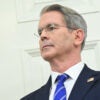Six secretaries of state from across America fielded questions in congressional testimony Wednesday about increasing public confidence in elections.
House Administration Chairman Bryan Steil, R-Wis., was among committee members who pushed the top state election officials on campaign finance, noncitizen voting, and other election security issues.
The secretaries of state who testified were from both parties: Republicans Cord Byrd of Florida, Mac Warner of West Virginia, and Frank LaRose of Ohio, plus Democrats Adrian Fontes of Arizona, Jocelyn Benson of Michigan, and Maggie Toulouse Oliver of New Mexico.
The Daily Signal depends on the support of readers like you. Donate now
Here are four key moments from the hearing.
1. ‘Red Line’ for Noncitizens on Voter Lists?
Rep. Anthony D’Esposito, R-N.Y., asked the secretaries of state how many noncitizens should be on voter registration lists.
The three Republicans and three Democrats all agreed: zero.
These responses come as most Democrats in Congress oppose a Republican-backed bill to require proof of U.S. citizenship to register to vote.
“Democrats say there is not a significant number of noncitizens registered to vote, but yet there is still evidence of noncitizens on voter rolls,” D’Esposito said.
“Tell us, what’s the red line?” the New York Republican added. “What is the number that we think makes it significant? What is the number that would require the federal government to implement policies to prevent noncitizens from voting in our elections?”
Byrd, Florida’s secretary of state, pointed to the 2000 presidential election in which Republican George W. Bush beat Democrat Al Gore by just 537 votes.
“It should be a zero tolerance policy,” Byrd said of noncitizens being registered to vote. He added: “Small numbers of people matter in elections.”
LaRose, Ohio’s secretary of state, said every vote matters.
“Every year, dozens of elections come down to a single vote. Those are usually local elections. But those matter,” LaRose said. “We say every vote matters. We mean that, and we should not allow any noncitizens to be on our voter rolls.”
2. Voter ID Not a ‘Magic Bullet’
New Mexico’s Oliver, a Democrat, said everyone should work together to increase confidence in election outcomes.
However, Oliver said voter ID would not help on that front. New Mexico doesn’t require photo identification for voting.
My book “The Myth of Voter Suppression” notes that more than 30 states have some form of voter ID law. Requiring voter ID is highly popular across all demographics, averaging about 80% support in most polls. It is also commonly used in almost every European country.
“We need to strengthen America’s confidence in our elections,” Steil said. “I think there are real commonsense reforms that can be done to make sure Americans have that confidence in our elections. … Would photo ID increase Americans’ confidence in our elections?”
Oliver responded: “I don’t believe so.”
Steil seemed surprised.
“You don’t believe having an individual show their ID, showing they are who they say they are, increases confidence in our elections?” he asked.
Oliver replied: “You asked me a yes or no question. I don’t think that’s a magic bullet.”
But Ohio’s LaRose, a Republican, agreed with Steil. He stressed that voter ID is “vastly popular among both Republicans and Democrats.”
Steil said photo ID is common in other parts of life.
“If you board an airplane, you’ve got to show your ID. If you want to buy a six-pack of beer, you’ve got to show your photo ID,” Steil said. “If you go into vote, it makes total sense that you should have to show your photo ID just to simply show you are who you say you are.”
Steil stressed that New Mexico doesn’t require photo ID to vote.
“New Mexico doesn’t have a photo ID law, something the state of New Mexico should look at,” Steil said. “There are real commonsense reforms we would like to see made in states like New Mexico that doesn’t have a photo ID law.”
3. Foreign Influence on Elections
Rep. Mike Carey, R-Ohio, noted that Ohio Gov. Mike Dewine, also a Republican, signed a bill into law in June to block direct and indirect foreign funding for ballot referendums. Foreign nationals already are banned from contributing to candidates.
Swiss billionaire Hansjoerg Wyss contributed $6 million to organizations supporting redistricting reforms on the Ohio ballot related to redrawing congressional and legislative maps.
“A lot of people outside of Ohio had a lot of interest in what Ohio was doing in its election,” Carey said, noting that only $200,000 of the money supporting the ballot initiative came from Ohio—out of $26 million raised.
LaRose, the Ohio secretary of state, said the law is needed.
“Unfortunately it is needed because there are foreigners who think they have a role in Ohio’s elections, including, by the way, a Swiss billionaire—who the day the governor called the special session to pass the bill barring foreign people from contributing made a contribution because he was trying to get in under the wire,” LaRose said.
4. ‘Worst Election Interference in American History’
West Virginia’s Warner, a Republican, stressed that restoring confidence in elections will require accountability from federal agencies that interfered in the 2020 election.
“The worst election interference in American history was done in 2020 by 51 so-called intelligence experts,” Warner told the House committee.
He was referring to the 51 former federal intelligence officials—some of them still contractors with the government—that made the debunked claim that Hunter Biden’s abandoned laptop and its contents were Russian disinformation.
“It was a lie and they knew it was a lie,” Warner said.
“Today’s hearing is about restoring election confidence. The first step to solving a problem is to admit there is one,” Warner said. “A number of U.S. government institutions need to publicly admit the enormity of improperly influencing a presidential election before confidence can be restored.”
West Virginia’s secretary of state said the security clearances of the 51 intelligence veterans should be revoked, and that the 51 should not hold another government position.
“Shame on the FBI for not timely exposing the lie and telling social media to suppress the story,” Warner said. “[Facebook founder] Mark Zuckerberg now admits that he shouldn’t have listened to the FBI.”






























